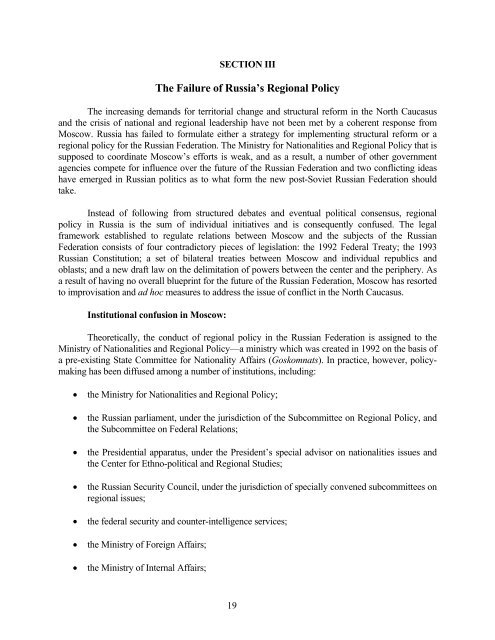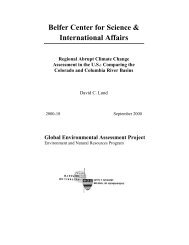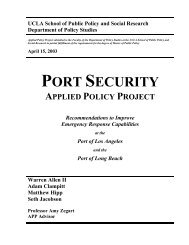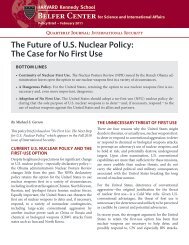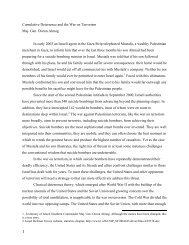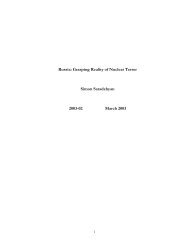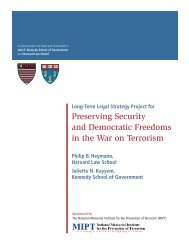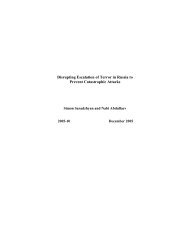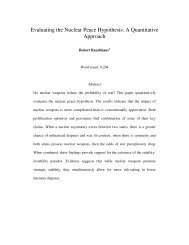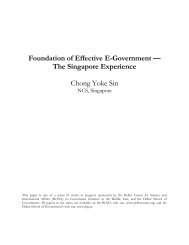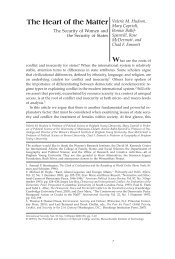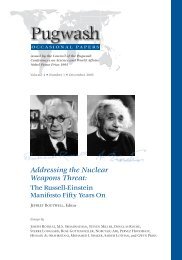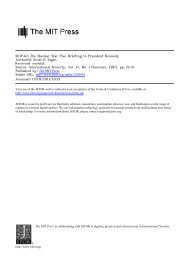RUSSIA'S TINDERBOX - Belfer Center for Science and International ...
RUSSIA'S TINDERBOX - Belfer Center for Science and International ...
RUSSIA'S TINDERBOX - Belfer Center for Science and International ...
Create successful ePaper yourself
Turn your PDF publications into a flip-book with our unique Google optimized e-Paper software.
SECTION III<br />
The Failure of Russia’s Regional Policy<br />
The increasing dem<strong>and</strong>s <strong>for</strong> territorial change <strong>and</strong> structural re<strong>for</strong>m in the North Caucasus<br />
<strong>and</strong> the crisis of national <strong>and</strong> regional leadership have not been met by a coherent response from<br />
Moscow. Russia has failed to <strong>for</strong>mulate either a strategy <strong>for</strong> implementing structural re<strong>for</strong>m or a<br />
regional policy <strong>for</strong> the Russian Federation. The Ministry <strong>for</strong> Nationalities <strong>and</strong> Regional Policy that is<br />
supposed to coordinate Moscow’s ef<strong>for</strong>ts is weak, <strong>and</strong> as a result, a number of other government<br />
agencies compete <strong>for</strong> influence over the future of the Russian Federation <strong>and</strong> two conflicting ideas<br />
have emerged in Russian politics as to what <strong>for</strong>m the new post-Soviet Russian Federation should<br />
take.<br />
Instead of following from structured debates <strong>and</strong> eventual political consensus, regional<br />
policy in Russia is the sum of individual initiatives <strong>and</strong> is consequently confused. The legal<br />
framework established to regulate relations between Moscow <strong>and</strong> the subjects of the Russian<br />
Federation consists of four contradictory pieces of legislation: the 1992 Federal Treaty; the 1993<br />
Russian Constitution; a set of bilateral treaties between Moscow <strong>and</strong> individual republics <strong>and</strong><br />
oblasts; <strong>and</strong> a new draft law on the delimitation of powers between the center <strong>and</strong> the periphery. As<br />
a result of having no overall blueprint <strong>for</strong> the future of the Russian Federation, Moscow has resorted<br />
to improvisation <strong>and</strong> ad hoc measures to address the issue of conflict in the North Caucasus.<br />
Institutional confusion in Moscow:<br />
Theoretically, the conduct of regional policy in the Russian Federation is assigned to the<br />
Ministry of Nationalities <strong>and</strong> Regional Policy—a ministry which was created in 1992 on the basis of<br />
a pre-existing State Committee <strong>for</strong> Nationality Affairs (Goskomnats). In practice, however, policymaking<br />
has been diffused among a number of institutions, including:<br />
• the Ministry <strong>for</strong> Nationalities <strong>and</strong> Regional Policy;<br />
• the Russian parliament, under the jurisdiction of the Subcommittee on Regional Policy, <strong>and</strong><br />
the Subcommittee on Federal Relations;<br />
• the Presidential apparatus, under the President’s special advisor on nationalities issues <strong>and</strong><br />
the <strong>Center</strong> <strong>for</strong> Ethno-political <strong>and</strong> Regional Studies;<br />
• the Russian Security Council, under the jurisdiction of specially convened subcommittees on<br />
regional issues;<br />
• the federal security <strong>and</strong> counter-intelligence services;<br />
• the Ministry of Foreign Affairs;<br />
• the Ministry of Internal Affairs;<br />
19


